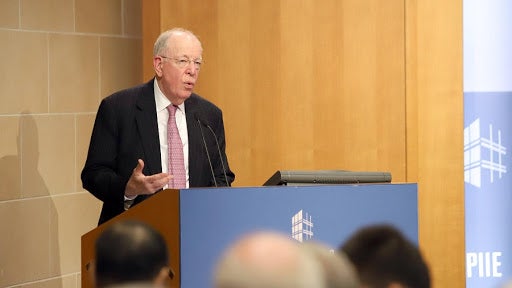I thank the Secretary General for his insightful overview, the High Commissioner for Human Rights for presenting the human rights picture that must inform all that we do, and the IMF and World Bank heads for laying out the wider economic context to which I will add the trade dimension.
If all were as it should be, I would not be joining this virtual meeting via a cell phone as the Wi-Fi is down in our area.
If all were as it should be, the person joining you today would be the first woman Director-General of the WTO since its founding 25 years ago, and for that matter the first woman Director-General of the multilateral trading system, created 73 years ago.
We can conclude, with the first wave of the pandemic having passed for some areas, and the second wave beginning here in Geneva, that the trading system is enduring despite the added stresses placed upon it.
The trading system performed better than expected during the second quarter with respect to merchandise trade, but there is limited comfort to be had in this statement.
- Global trade saw a modest uptick in recent months, a function of extraordinary fiscal and monetary measures as well as the fact that trade restrictions have been confined to a limited number of sectors and products.
- The decline in world merchandise trade – still serious when last forecast at 9% -was better than our most optimistic outlook earlier in the year.
- However, services trade declined by 30% over the 12 months to the second quarter of 2020, with travel and tourism hit particularly hard, and the present prospects are at best clouded.
So far, the trade recovery has been stronger on the supply side than on the demand side: a strong, sustained global recovery also requires robust demand. While there were some positive signs of this in the September data, the continuation of the incidence of COVID-19 infections and the measures taken to counter risks to health place the strength and timing of recovery of world trade in doubt.
- The global response to the pandemic has not yet succeeded in curbing either the threat to health or the ongoing damage to the global economy.
- It is far from clear that we will return to pre-pandemic trajectory at all, and not in 2021.
- Trade policy decisions, as well as other economic policy choices, will matter.
The bottom line –
- While the pandemic exposed some of the fragilities that come with economic interdependence, it has also revealed considerable strengths. For example, trade has been a key means of ramping up access to medical supplies.
- Value chains have shown a surprising degree of resilience: preliminary data suggest global trade in intermediate goods has fallen less sharply than trade in final goods – implying that value chains now account for a higher share of world merchandise trade than they used to.
- For the large-scale refrigeration capacity needed to roll out a future COVID-19 vaccine, it will not make sense to try to develop new national supply chains for specialized cold chain equipment. It would be more effective to leverage existing supply chains.
- Even the world’s most sophisticated economies rely on others for certain medical goods, not to mention agricultural products.
- While the trading system alone cannot solve the problems facing the world, it can assist in providing solutions. Functioning well, the WTO can be a forum in which to bridge differences and build trust.
- More trade, not less, will bring essential medical supplies, drugs, and soon, we earnestly hope, vaccines to where they are needed.
- More trade, not less, will assure food security in the face of both the pandemic and severe climate events.
- More trade, not less, will play a key role in delivering economic growth as it has over the last seven decades.
- Closing off markets would only make us more vulnerable, and less prosperous.
- Broadly open international markets are essential and must be anchored in cooperatively determined rules.
To view the original post, please click here.
WTO Nov 10 2020 DocAmbassador Alan Wm. Wolff is Deputy Director-General of the World Trade Organization


